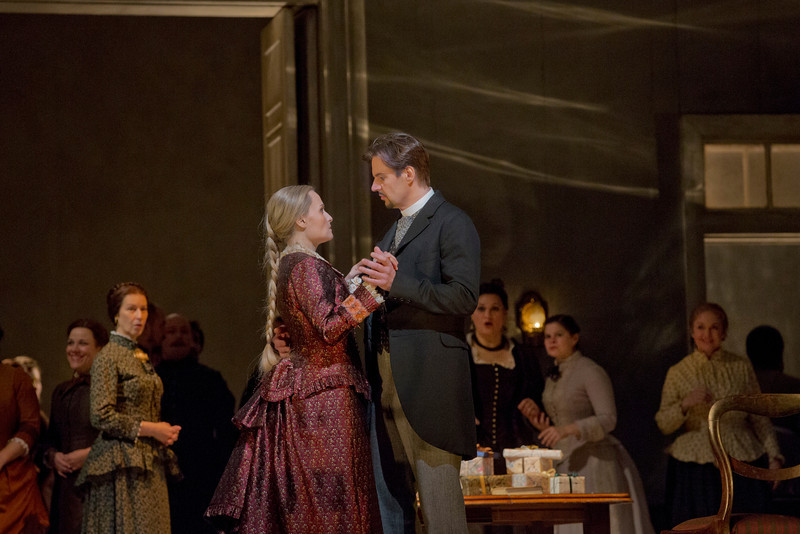New cast and conductor for Met’s “Onegin” bring mixed results

Marina Poplavskaya as Tatiana and Peter Mattei as the title character of Tchaikovsky’s “Eugene Onegin.”
Photo: Ken Howard/Metropolitan Opera
The Metropolitan Opera’s attractive, naturalistic new production of Eugene Onegin continues into the middle of December, and last night a new cast debuted, with changes in all the major roles and in the pit. While a couple singers mark an improvement over opening night, the overall result, unfortunately, is a drastic diminishment in the quality of the overall performance.
Anna Netrebko as Tatiana and Mariusz Kwiecien as Onegin have been replaced by Marina Poplavskaya and Peter Mattei. Elena Maximova debuts at the Met in the role of Tatiana’s sister, Olga (replacing Oksana Volkova), and she’s joined in the drama by the new Lenski, Rolando Villazón (instead of Piotr Beczala). Valery Gergiev is off to one of his myriad stops, and Alexander Vedernikov, a veteran of the Bolshoi Theatre, is the new conductor. In the small but important role of Prince Gremin, Tatiana’s husband in Act III, Stefan Kocán, fresh off his role as Sparafucile in the Met’s production of Rigoletto, glows as a replacement for Alexei Tanovitski.
The leads amount to a net gain. Poplavskaya doesn’t have Netrebko’s vocal charisma, but she’s a fine singer nonetheless and a far more naturalistic actor. Where Netrebko was dramatically stiff or passive, Poplavskaya is believable as a young girl and, in Act III, a young woman with an inner life, which is clear even when the music and staging move her out of the spotlight.
Mattei is terrific. His voice is beautiful and his phrasing is so musical and intelligent that it seems like one is hearing the role for the first time. He’s also a commanding stage presence, relaxed and confident, and his characterization is vivid and deep. As Onegin, he carries himself with a pleased self-regard that clearly and logically transforms into bitter self-reproach.
Gremin has one thing to do—sing “All men surrender to Love’s power”—and Kocán was mesmerizing. His phrasing seems four-square at first, but it turns out to be the surface sound of a satisfying exactitude. If it had only been possible to keep Volkova and Beczala, who sang and acted so well, this would have been an extraordinary dramatic experience. As Olga, Maximova is vivacious and her voice has a pleasing darkness, but she doesn’t have the theatrical strength of Volkova.
Villazón is miscast in this production. While the tenor’s voice sounded clear and strong, his manner relied on cultivated upward scoops to hit high notes and telegraph the most superficial emotions. Where producer Deborah Warner and director Fiona Shaw emphasize realism, Villazón — despite here resembling the young Trotsky — hams it up and edges into self-indulgence. The audience acted as enabler Saturday, applauding his return to the Met even before he sings a note.
Vedernikov is the biggest problem, and it’s nearly a fatal one. One doesn’t expect the same orchestral glow and lyricism from anyone other than Gergiev, but it’s not too much to expect a forward line, expressive phrasing and coordination with the singers. The first act was a disaster of wayward tempos, orchestra and characters consistently at different speeds, accelerandos and rallentandos going in all directions.
To his credit, Vedernikov worked assiduously to follow the singers in the later acts, and tempos matched more consistently. But the overall music-making was dull. There was fitful energy, but little warmth in the song-like music that opens Act II, and the waltzes and urgent emotional accompaniment in Act III were a mess of sloppy accents and rhythms.
There are minor but noticeable changes to the blocking, especially Onegin ripping off his coat in anguish after realizing that he is truly in love with the now-married Tatiana. It’s notable for being a clumsy distraction from the flow of action and emotion. A detail like this would be inconsequential, if not for the dullness of the musical direction, which leaves the viewer grasping for anything interesting or notable.
Eugene Onegin runs through December 12. metoperafamily.org




Posted Nov 25, 2013 at 12:36 pm by JR
Did anybody else hear the iPhone going off during the climatic final silence? Yikes.
Posted Nov 26, 2013 at 10:40 am by francois girardot
Overall it’s a solid production. I love the farewell kiss! I think Poplavskaya was great in the first act, as a young Tatyana. That’s how I picture the character. Her feverish rendition of the letter scene was moving. But I also find Netrebko is very convincing in the third act. She’s more mature. She and Kwiecien have great chemistry in the finale scene, to me they’re hard to beat in the last 15mn of the opera. Kwiecien is an excellent actor, very touching and though Peter Mattei is one of my favorite voices in the world, I think he’s a little less charming there. Still Peter Mattei is terrific, as always. So I would give the first act to the new cast (Poplavsjkaya/Mattei) but the third one still goes to the old one (Netrebko/).
I did not like Villazon in the first act, he was gesticulating way too much and his voice seemed a bit constrained BUT he was very good later (the duel)! So I would not say he was miscast. The second roles were very solid. A good Olga and a very very impressive Gremin (Kocan deservingly got his round of applause).
Note: yes, I heard that damn mobile phone (dress Circle right hand side) in the last scene. I would burn alive the guy…
Posted Dec 07, 2013 at 2:19 am by RK
Just came from the 12/5 performance. I too was uncomfortable with Villazon in the first act, and dreamed about the pairing of Mattei and Beczala, who was so winning in this role. But Villazon improved as the night wore on, and I must say, delivered a really moving, heartfelt and artistically expressive “Kuda”, his duel-scene aria. This was the best I’ve heard, after Fritz Wunderlich’s miraculous recorded version. The power here, in Villazon’s delivery, came from that bit of magic one longs for in live theater…though there’s nothing magical about it, really. When you believe the character, when you believe what he is feeling and expressing in the moment. No artifice. No “acting”. Villazon brought me this, and my earlier quibbles were long forgotten.
Mattei’s voice is a gift from the gods. I’ve loved this man ever since hearing his Figaro at the Met, in “Barbiere”, opposite Juan Diego Florez’s Almaviva. Now there’s a pairing! He delivered the most gorgeous “Deh vieni alla finestra”, the serenade from “Don Gionanni”, that I”ve heard to this day.
Back to this production, of “Onegin”. Poplavskaya’s voice isn’t perfect, but she sounds like s flesh-and-blood human being, which is a good thing. Something is wrong with the production, can’t figure out what it is. But to the Met I have to say, “Good job”. You’ve assembled a stellar cast.